
PUMPA - SMART LEARNING
எங்கள் ஆசிரியர்களுடன் 1-ஆன்-1 ஆலோசனை நேரத்தைப் பெறுங்கள். டாப்பர் ஆவதற்கு நாங்கள் பயிற்சி அளிப்போம்
Book Free DemoSECTION - I
This story is set in a North Indian city called Dehradun. One day the author was sitting on the balcony steps with his grandfather. He noticed that a slender thread-like stem coming out of a climber plant, from a creeping tree near them. It was early in the morning, and there was soft sunshine, and maybe a light breeze that moved the tendril slowly towards his grandfather. After twenty minutes, it had crossed the balcony steps, and it was touching his feet. The author says North Indian winter in this paragraph. It refers to a pleasant to cold temperature, could be in October to March.

Tendrils.
The tendrils had moved towards grandfather due to the warm sunshine and some breeze perhaps. But according to the author, he had a different explanation. He felt the plant liked to come near his grandfather and that's why it had moved. He felt his grandfather always drew people towards him. When the author sat below a tree by himself, he always felt lonely; but if his grandfather joined him, he felt the garden became a happier place. He had a reason for it - his grandfather had worked for the Indian Forest Service, and he knew well about trees. After his retirement, he had built a bungalow on the outer parts of Dehradun. He planted many trees around his house - lime, mango, orange, guava, eucalyptus, jacaranda (also known as fern tree), and Persian lilacs. The parts near the Dehradun valley are known for their fertile soil, and the trees looked tall, healthy and strong.
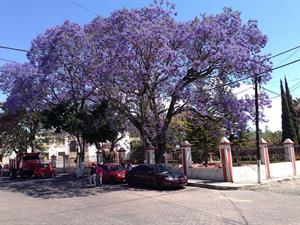
Jacaranda tree. Also seen - eucalyptus tree, lime and other trees around the bungalow.
Before the bungalow was built, there were many other trees in that compound, including an old peepul tree. It had grown and pushed itself inside the walls of a lonely outhouse, after breaking the bricks with its strongly grown barks. The author says peepul trees are generally boastful. Even when there is no breeze, the leaves spin and move like tops, just to attract us to come into its shade. He has described this part with humour and imagination. He says the leaves have broad chests and slim waists.
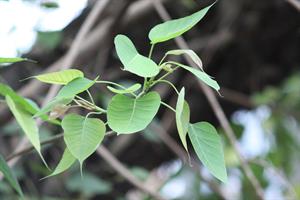
Peepul leaves - broad-chested and slim-waisted!
The author's grandmother did not like the peepul tree emerging into the outhouse; she wanted to cut down the tree. But grandfather had told her that they could build another outhouse and let the peepul tree remain. Grandmother was not against trees, but she liked flowering plants better. She constantly bought a complete list of seeds for growing flowers. Grandfather also helped her with her garden. More than the flower garden, grandfather liked watching the butterflies that were attracted to flowers. That's why he helped his grandmother. He had mentioned that growing flowers is the only way to attract butterflies.
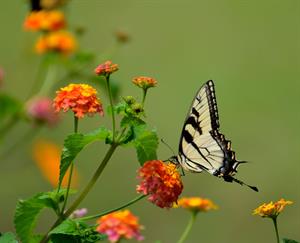
Grow flowers for butterflies!
SECTION - II
Grandfather had a compound full of trees, but he was not satisfied. During the rainy reason, he would go into the jungle which was located beyond the riverbed. He would take pieces of plants and young trees for growing more trees in the jungle. The first time when the author had accompanied him, he asked him why he had to do this, as no one ever came to the jungle and nobody is going to see them.
The wise grandfather replied that they were not planting the trees for good views but for the following reasons:
- Planting for the forest.
- For the animals and birds that lived there and required more food and shelter.
Grandfather further added that humans also needed trees for the following reasons:
- To keep the land fertile and not dry like a desert.
- To bring more rain.
- To prevent the soil from getting eroded.
- To get more flowers, fruits, leaves and seeds.
- To get more wood.
He finally said that people are cutting down trees without replacing them. If we cut a tree for any reason, we should make sure we replace by planting more number of trees. If we don't plant a few trees for ourselves, the whole world will become a desert soon, without any vegetation, rain or life.
As grandfather explained to the author, the thought of a world without trees became like a scary dream to him. He helped his grandfather with planting trees with more interest and involvement.
His grandfather also taught him a poem written by George Morris. The poet tells a woodman to let go of the tree that he is about to cut and that he should not touch a single branch of the tree as it had sheltered him when he was young. It was the poet's turn to protect the tree now.

Woodman, Don't cut the tree!
The grandfather continued his explanation. He said one day the trees would move again. There had been a time when trees walked like people. A troublemaker came along, and he used magical powers to stop them from moving and fixed them deeply in the ground. The trees have been standing motionless for thousands of years because of this spell. But they will always try to move, explained the grandfather. He asked him to see how far they have stretched out their arms. He quotes the example of the banyan tree which has managed to move far with its roots in the air.
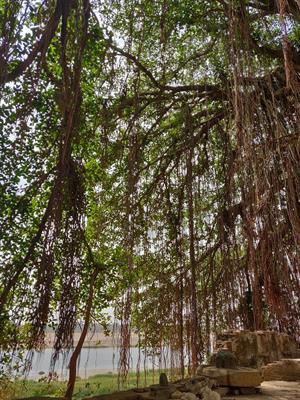
Banyan tree with aerial roots.
Later, they found a small island filled with rocks in a dry river-bed area which became very dry during summers but got submerged in water during monsoon rains. They saw a small mango tree growing on that island. His grandfather said if a small tree can grow in such dry conditions, trees can grow anywhere.
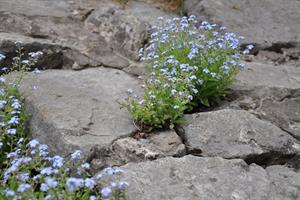
If plants can grow in dry rocks, it can grow anywhere!
As soon as the monsoon set the rains began; the rivers were not flooded because the rain had just started - so one could cross the river easily. They started with many saplings and cuttings of tamarind, laburnum and coral trees and spent the whole day planting them on the island.
SECTION - III
The monsoon season had started. The author says that monsoon was the time for rambling about. It means rambling in two senses. One refers to wandering about. Wherever the author wandered in his city, he saw something new in every turn. The other meaning refers to the plants putting out long shoots and growing over walls or other plants. All the plants had sprung up out of the earth, from leafless branches, fresh and new in the rains during the monsoon.
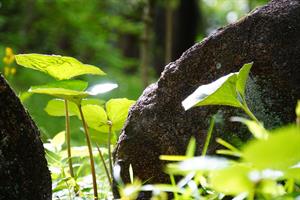
The magic touch of rains brought life and greenery!
It symbolizes new life and lush green vegetation. The creeping trees with broad leaves in their garden grew up. Plants came out of unexpected places like
- Peepul tree roots went into the ceiling.
- A mango plant sprouted in the window sill.
They did not want to remove them, but they had to remove it; otherwise, the house will fall under the weight of the trees. His grandmother said annoyingly that if they wanted to live in a tree, it was alright, but she wanted to have a roof over her head and not want the roof to be collapsed by the jungle. She expressed it sarcastically.
It was the time of the Second World War (between \(1939\)-\(1945\)). The author had been a school kid by then, and he was sent away to a boarding school. During his holidays he went to Delhi to stay with his father. His grandparents had sold the house in Dehradun and moved to England. After two-three years, he also went to England and stayed away from India for several years.
After some years the author returned to Dehradun. He visited the old house, and it had looked almost the same. He walked to the outskirts to the riverbed. It was the month of February. He saw the dry riverbed, and he immediately saw the striking red flowers of the coral blossom.
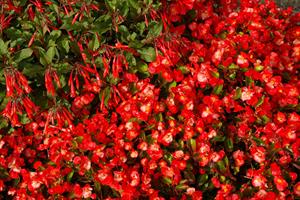
Spectacular coral-red blooms!
The river-bed was dry, but in contrast, the island looked like a small green paradise. He walked up to the trees and noticed that some squirrels, a koel, crow pheasant were living in the tree. It seemed to him like they were all asking him who he was, in a soft, smooth voice.
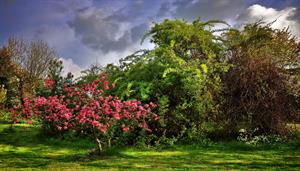
The island looked like a small green paradise!
The author felt the trees knew him. They seemed to murmur amongst themselves and signalled him to come closer to them. He also noticed that there were other smaller trees, wild plants, and grass had emerged out under the shelter of the trees. The trees planted long back had increased in number. They seemed to be walking again. The author realized that his grandfather's dream had come true.